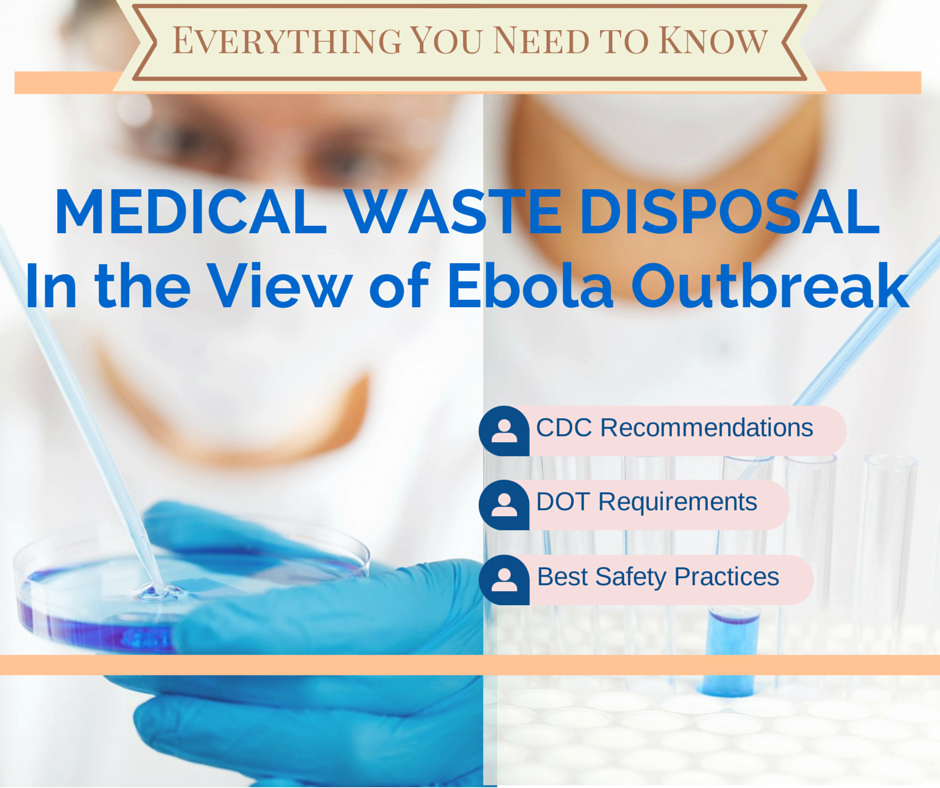OPERATIONS UPDATE: 1/27/26 BWS, Inc. is back to full operations. Please contact us with any questions or concerns about your scheduled pick up - (410) 437-6590 or customercare@bwaste.com
Medical Waste Disposal in the View of Ebola Outbreak
The opinions are split when it comes to evaluating our country's preparedness for a potential Ebola outbreak. According to a recent study, 56 percent of Americans think that U.S. is prepared to handle and contain this potentially deadly virus. How confident is your medical facility in the ability to deal with an Ebola patient, however unlikely it may seem for your practice? The Texas Health Presbyterian Hospital Dallas was not prepared enough, which resulted in a loss of a patient and two staff members who contracted Ebola. From proper personal protective gear to patient isolation and medical waste disposal, there are many protocols to follow when it comes to containing the spread of a deadly virus such as Ebola. And considering the copious amounts of medical waste generated during care for such patients, Ebola-contaminated waste disposal might be one of the biggest challenges for medical facilities. It's crucial to have a plan and a local medical waste collector who can provide reliable Ebola waste removal services.
Types of Medical Waste From Ebola Patients
Emory University Hospital in Atlanta was the first institution to care for Ebola patients in the U.S. As one of its doctors shared, at the peak of the disease, the facility generated 40 bags of medical waste a day! And here is where it all comes from.
Personal Protective Equipment (PPE)
There are different types of PPE that should be used by medical personnel during contact with an Ebola patient. Make sure your staff knows how to properly apply and safely remove the following protective gear:
- disposable gloves
- fluid-resistant gown
- goggles or face shield
- face mask
- hood and neck covering
- protective body suit
- fluid-resistant leg and shoe coverings
Waste From Cleaning & Disinfecting
CDC recommend daily cleaning and disinfecting of hard, non-porous surfaces in the patient's room. This may include floors, counters, bed rails, tables, etc. While disinfectants were designed to deactivate the virus, these procedures may still produce potentially contaminated waste, such as:
- cleaning and mop clothes
- wipes
- empty cleaning product containers
- gloves and other PPE
Patient Care Waste
Ebola is transmitted through contaminated bodily fluids, mainly blood, feces, saliva, urine and vomit. The course of the disease and its specific symptoms make it easy for these fluids to come in contact with unprotected healthy individuals. It starts with flu-like symptoms, including fever, muscle aches and headache, then comes diarrhea, vomiting and stomach pain. Internal and external bleeding (out of ears, nose or eyes) is also common in Ebola patients. Administering treatments and maintaining hygiene of such patients involves large amounts of contaminated waste, such as:
- patient's personal belongings
- bed linens and privacy curtains
- syringes, scalpels and other sharps
- patient care equipment
- patient gowns
- portable toilets
- stained or soiled bandages
- lab testing materials
CDC recommends using a “buddy system” when caring for patients, as well as putting on and removing PPE. This way medical staff can supervise each other to make sure all protocols are followed correctly.
Proper Disposal of Ebola Medical Waste
Hazardous Material Regulations (HMR) developed by the U.S. Department of Transportation (DOT) classifies the Ebola virus as a Category A infections substance. When transported to the site of deactivation, all contaminated items should be treated according to the HMR. This is the part that BWS will handle for you safely and responsibly. You just need to do your part and ensure proper collection and storage of Ebola medical waste by following CDC's recommendations and DOT's requirements. According to HMR, a Category A substance such as Ebola virus is different from regulated medical waste. Due to the high risk of contamination and potentially deadly outcomes, “more stringent packaging” should be used for Ebola-contaminated waste when transportation is involved.
DOT requires triple-packing Category A waste before transportation in:
(1) A primary plastic film bag with added EPA-registered disinfectant for non-enveloped virus. After the bag is sealed, the bag's exterior should also be disinfected. (2) A secondary plastic film bag that is also disinfected from the outside and has added absorbent material to contain the liquid in case of a spill. (3) A rigid UN Standard or DOT Approved non-bulk packaging also disinfected from the outside. CDC, on the other hand, doesn't require such packaging when the contaminated waste is collected. The two agencies are currently discussing how to bridge this gap and come up with consistent regulations for Ebola waste disposal. Meanwhile, CDC suggests that on-site incineration or autoclaving can be used to deactivate the virus. In this case, the deactivated virus can be packaged and transported as regulated medical waste, as it's no longer infectious. Whenever possible, CDC recommends using disposable items during care for Ebola patients, as well as collecting waste at the point of generation, which is inside the patient's room.
Is Your Medical Waste Collector Prepared to Handle Ebola Waste?
You could be doing your part in following safety protocols and Ebola waste packaging regulations, but is your medical waste vendor ready to pick up this dangerous cargo? At BWS, we are fully prepared to handle infections waste and have taken extra measures to ensure the safety of both our staff and your personnel during collection and transportation.
To Better Serve You:
- We created a plan that outlines procedures and safeguards for handling of highly infectious waste.
- We expanded our Infection Control protocol to include extensive uniform cleaning, safe uniform removal procedures and instructions for our drivers to have a clean set of clothes in event of contamination.
- We increased the frequency for changing gloves and hand sanitizing after each pickup.
BWS is currently in the process of obtaining the special DOT permit #16279 to be able to handle pure Ebola waste. Meanwhile, if you have an on-site autoclave or incinerator, we can transport deactivated Ebola waste as UN 3291 regulated medical waste. BWS provides comprehensive infectious waste disposal services to over 7,000 generators in Maryland, Delaware, Virginia, West Virginia, Pennsylvania, and Washington, D.C. Contact BWS today to discuss how we can help!
Ready to get started?
We offer a variety of competitively priced service options with no contracts or hidden fees. Request a free quote.
Our Dedication to Providing the Highest Quality Regulated Waste Services
is Shown in What Our Clients Say About Our Work
We provide an outstanding value and service to our regulated waste customers and pride ourselves over the last 50 years on our 100% customer satisfaction with 99% customer retention ratio.
Paul R Miller, D.D.S. and Team
ZytoGen Patient Services
Akbar Masood, D.D.S.
Chris Donaldson
Dharani Jasthi
Tomicka Jackson-George, D.M.D.
Louis Sachs, D.D.S.
Kate Blair English
Dave Ryan
Kerry Owens, Avalon Plastic Surgery
Jamie Fleming, National Spine & Pain Centers
Keith Roberts, Biomatrix Specialty Pharmacy
Mireia Pedragosa Marin, Synergy Research
Rebecca Crouse, Randolph Macon Academy
Melissa C, Patriot Chiropractic
Dr. Rosario Ignacio
Dr. Thomas Lutz, Odenton Family Dentistry
Dr. Louis Sachs, DDS
Eric B.
Brenda Shah
Stay connected - Be the first to know!
Get BWS news and promotions straight to your inbox
Don't worry. We won't sell your information!





